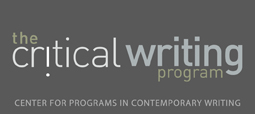Comparative Literature
An Overview of the Discipline
Comparative Literature emerged as an academic discipline in the wake of World War II, when many European immigrants moved to the United States. This mixing of cultures fostered a spirit of cosmopolitism in the wake of international disasters resulting from nationalism turned violent. Literary studies, cultural studies, and language studies combine in this multifaceted discipline, which examines both the texts themselves and the relationship between what is written and the context and culture in which it was written. The discipline often involves studying multilingual authors who publish texts in more than one language.
Writing in the Discipline
Reasoning
As a literary discipline (also see English) the reasoning in Comparative Literature tends to be justificatory, with explanatory reasoning used in the service of the larger goal to justify a particular interpretation or position. However, in this and other literary fields, argument generally proceeds by example (quotation and analysis) rather than, as in the social and natural sciences, by reasons and evidence.
Evidence
Evidence in Comparative Literature is text-based direct quotation. Close reading is an essential skill. Professor Rita Barnard explained that “engagement with the text” is a vital part of identifying evidence. However, students must beware complete dependence on the text itself, for historical and cultural contexts are also typically important in writing about a literary text. Some Comparative Literature faculty may require that students include quotations in the language in which the text was originally written, as they may otherwise lose meaning in translation. This does not mean that you have to read pieces in languages other than English in a Comparative Literature course; it just means that professors may prefer to see the quotation in the original rather than translated version.
Authorship
While typical assignments for undergraduates will be single-authored, in the scholarly world of Comparative Literature one increasingly finds collaborative authorship. While single-author scholarly articles and books still prevail, collaboration has become more prevalent in recent years. Authors may collaborate in the research or writing of a book or article.
Writing Tips
Process
Both Professor Barnard and Professor Rabaté stress the importance of accruing a significant amount of information directly from the text before beginning to write. Students may wish to create a list of quotes they may want to use, or at the very least bookmark places in the text that may come in handy. Deciding on a structure that fits the argument is almost as important as deciding on the argument itself, so students will want to have a solid plan for the structure of the piece before they begin. As writing in Comparative Literature can be very personal or very subjective, students may wish to leave enough time to think through their ideas fully and be able to develop strong opinions before they begin the actual writing process.
Common Errors
Your thesis should be original! Professors of Comparative Literature often find a major issue in students' writing to be that the main idea of a paper has already been discussed in great detail somewhere else.
Professor Rabaté said that the most common error he finds in students' papers is simply that students are often too ambitious in their topics, choosing themes for their writing that are too broad to be useful. He finds that students are more successful once they learn to trust themselves to be able to write an engaging piece on a more specific topic.
Professor Barnard has found that common student errors are often more related to the writing than to the reasoning. She explained that students need to learn that writing longer, more developed paragraphs, and observes that students often have an idea of a paragraph that is very visual – it must look short and neat and fit well on a computer page – that does not fit writing in Comparative Literature. She also warns students not to have "throwaway" paragraphs that do not add anything to the piece.
Finally, Professor Barnard notes that a thesis statement in Comparative Literature may be several sentences long, rather than one succinct statement.
Genres
Student Assignments
Undergraduate assignments are typically analytical, examining the themes, symbols, or ideas evinced in a particular text through a specific interpretive framework often provided by the professor. You may also encounter some creative pieces, such as rewriting a story emulating the style and technique of a particular author.
Professional Writing
Scholars in Comparative Literature typically write peer-reviewed journal articles and monographs. They may write essays to be published in a collection with other scholars. You may also find that these scholars write novels, biographies, and even comics.
Additional Resources
Helpful Books for Academic Writing
Style: Ten Lessons in Clarity and GraceThey Say I Say: The Moves that Matter in Persuasive Writing
© 2013-2014 The University of Pennsylvania
Meet the Professors

Dr. Rita Barnard
Professor Barnard considers herself a "political formalist," in that she seeks to connect the literary and cultural with the social. More...

Dr. Jean-Michel Rabaté
Professor Rabaté has an extensive collection of work, having written or edited more than thirty books. More...
